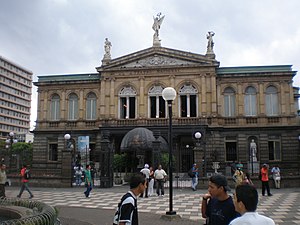National Theatre of Costa Rica
| Teatro Nacional de Costa Rica | ||||
|---|---|---|---|---|
National Theatre of Costa Rica
|
||||
| General information | ||||
| Type | Arts complex | |||
| Architectural style | Neo-classical | |||
| Location | San José, Costa Rica | |||
| Completed | 1897 | |||
| Opened | 1897 | |||
| Design and construction | ||||
| Structural engineer | Ruy Cristóforo Molinari | |||
| Awards and prizes | Institución Benemérita de las Artes Patrias (Costa Rica, 1999); National Monument (Costa Rica, 1965) | |||
The National Theatre of Costa Rica (Spanish: Teatro Nacional de Costa Rica) is the national theatre of Costa Rica. It is located in the central section of San José, Costa Rica. Construction began in 1891, and it opened to the public on 21 October 1897 with a performance of Johann Wolfgang von Goethe's Faust.
The National Theatre stood as a cultural asset of the country during a time when coffee exports were a source of its success. It presents high quality performances, with artistic criteria being very high.
The building is considered the finest historic building in the capital, and it is known for its exquisite interior which includes its lavish furnishings.
Constructed in the late 19th century, when San Jose's population was only around 19,000 people, the theatre presented many private performances. Its only real competition was the Teatro Mora (also called the Municipal Theatre, or Teatro Municipal), that existed for many years before the National Theatre, until it was destroyed and deemed unsafe by an earthquake.
To finance the construction of a theatre suitable for name "National Theatre", the President of Costa Rica, José Joaquín Rodríguez Zeledón decided to place a tax on coffee, then the principal export product. Later, one coffee planter begged the government to remove the export tax on his product and put it on rice and beans (also principal export products of the time).
There were many problems during the early period of construction. However, the construction errors were corrected by an Italian engineer who was brought in to direct the process. It took seven years to finish the theatre, and the inauguration took place on 21 October 1897.
The front of the theatre features statues of Calderón de la Barca and Ludwig van Beethoven. There are several monuments by the entry walkway including Frédéric Chopin. The inside features the mural Allegory of Coffee and Bananas by Milanese artist Aleardo Villa, which is featured on the five colón bill.
...
Wikipedia


